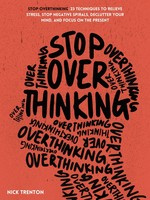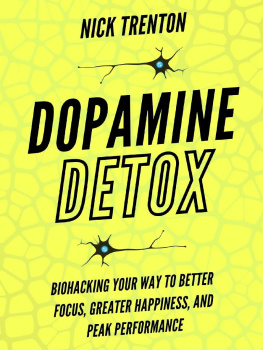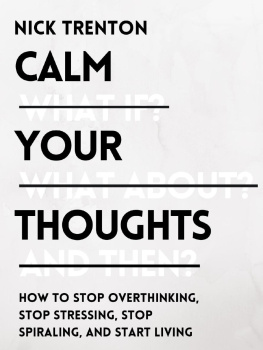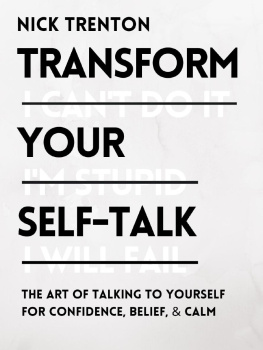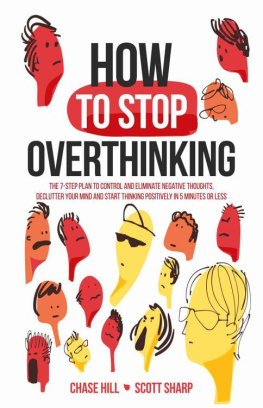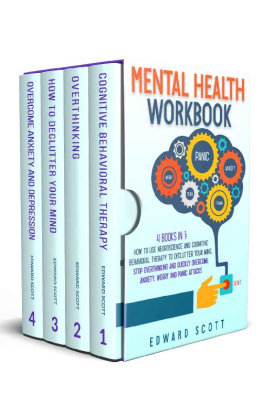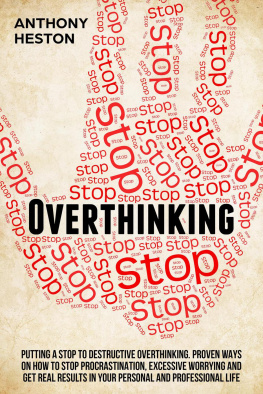Nick Trenton
Stop Overthinking
23 Techniques to Relieve Stress, Stop Negative Spirals, Declutter Your Mind, and Focus on the Present
Stop Overthinking:
23 Techniques to Relieve Stress, Stop Negative Spirals, Declutter Your Mind, and Focus on the Present
by Nick Trenton
www.NickTrenton.com

Pick up your FREE 22-PAGE MINIBOOK: The 4 Essential Elements of Emotional Well-being and Happiness
- Unconventional ways to instantly de-stress and become present
- Live with intention because you know your core values
- 3 methods to scientifically enhance your mood and more fulfilled
<< Just click right here to gain inner motivation and quiet your mental chatter. >>
Table of Contents
Causes for Mental Clutter and Agony
Is it you?
Is it your environment?
The secret ingredient: our mental models
Consequences of overthinking
The 4 As of Stress Management
Stress Diaries and Journals
The 5-4-3-2-1 Grounding Technique
Narrative Therapy and Externalization
Stress Management 101
How to Manage Your Time, Energy, and Inputs
Allens Input Processing Technique
Eisenhowers Method
Setting SMART Goals
Kanban Method
Time Blocking
Autogenic Training
Guided Imagery and Visualization
Progressive Muscle Relaxation
Unraveling Your Cognitive Distortions
Getting Rid of Cognitive Distortions
Using CBT to Clean Up Your Self-Talk
Self-Scripting: Fostering and Reinforcing Positive Self-Talk
Attitude 1: Focus on what you can control, not on what you cant
Attitude 2: Focus on what you can do , not on what you cant
Attitude 3: Focus on what you have , not on what you dont have
Attitude 4: Focus on the present, not the past or the future
Attitude 5: Focus on what you need , not what you want
Emotion Regulation Via the Opposite Action
Chapter 1. Overthinking Isnt About Overthinking
Imagine a young man, James. James is kind, intelligent and self-awareperhaps a little too self-aware. James is always worried about something, and today hes worried about a little health niggle thats caught his attention. He researches online, and gets steadily more alarmed at the possibilities. Then he stops and checks himself: Im probably overthinking things, he thinks.
So he stops stressing about his healthand starts stressing about his thoughts about his health. Maybe what he really needs is some therapy. But what kind? His thoughts run away with him and soon he is inwardly debating his options for counseling, arguing with himself, putting himself on trial, defending himself, questioning himself, ruminating on endless memories, guesses, fears. He stops and checks himself. He wonders, Is this what its like to have anxiety? Is this a panic attack? Or maybe I have schizophrenia and dont even know it yet. He thinks that nobody else agonizes over nothing like he does, right? In fact, the moment he has that thought, his head is filled with seemingly millions of examples of all the times people have criticized him.
He then puts a magnifying lens on all his flaws, and starts turning each of them over in his mind, wondering why he is the way he is, tortured by the fact that he cant seem to just let it go. After an hour of this, he realizes with despair that he is no closer to making a decision about his health issue, and instantly feels depressed, sinking into a storm of negative self-talk where he tells himself over and over again that this always happens, that he never sorts himself out, that hes too neurotic
Phew! Its hard to see how all of this torment and mental anguish started with nothing more than James noticing he had a weird-looking mole on his shoulder!
We all live in a highly strung, overstimulated, highly cerebral world. Overthinking puts our ordinary cognitive instincts in overdrive. Excessive thinking occurs when our thought processes are out of control, causing us distress. Endless analysis of life and of self is usually unwanted, unstoppable, and self-defeating. Ordinarily, our brains help us solve problems and understand things more clearlybut overthinking does the opposite.
Whether you call it worry, anxiety, stress, rumination or even obsession, the quality that characterizes overthinking is that it feels awful, and it doesnt help us in any way. Classic overthinking often amplifies itself or goes round in circles forever, and thoughts seem intrusive.
Overthinking is excessively harmful mental activity, whether that activity is analyzing, judging, monitoring, evaluating, controlling, or worryingor all of them, as in Jamess case!
Youll know that overthinking is a problem for you if:
- You are often conscious of your own thoughts moment to moment
- You engage in meta-thought, i.e. you think about your thoughts
- You try hard to control or steer your thoughts
- You are distressed by or dislike spontaneous thoughts and often feel that some thoughts are unwelcome
- Thinking for you often feels like a struggle between competing impulses
- You frequently question, doubt, analyze or judge your thoughts
- In crises, you often turn to yourself and your thoughts as a source of the problem
- You are focused on understanding your thoughts and digging into the inner workings of your mind
- You have trouble making decisions and often doubt the choices you do make
- There are many things youre worried and concerned about
- You recognize yourself engaging in negative thoughts patterns, over and over
- Sometimes, you feel like you cant help returning to a thought numerous times, even when its in the past and nothing can be done anymore about it
Youll notice that some of the above are arguably good qualitiesdont we all want to cultivate greater awareness and mindfulness? Isnt it good to question your knee-jerk reactions and ask yourself big questions so you can make better decisions? The gist of overthinking is in the nameits when we think over, above and beyond what is beneficial for us.
Thinking is a marvelous gift. The ability to reflect, to analyze, and interrogate even our own thought processes is arguably the single most defining characteristic of humankind, and the cause for many of our successes. Thought is not an enemy. Our brain is an extraordinarily helpful tool, but when we over think, we only undermine its power.
Causes for Mental Clutter and Agony
If the brain is such a wonderful thing and if thinking is so useful, then why is it so common and indeed so easy for people to get lost in overthinking? People over the ages (probably overthinkers) have proposed their theories: perhaps overthinking is a bad habit, or a personality trait, or a mental illness that can be medicated away. In fact, the reasons why a person overthinks can often become a favorite topic of obsession for those that overthink. Why why why am I like this?
If youve picked up this book, its likely that you have been distressed by how your own brain seems to run away with you. But there are solutions, and there are ways out of stress and ruination and into clearer, calmer waters. The first thing to note, however, is a big one: the causes of overthinking are seldom the focus of overthinking . What does this mean? In Jamess example, his overthinking has nothing to do with the scary-looking mole on his back. It has nothing to do with choosing the right psychologist or what that person said to him twenty-three years ago or whether he should feel guilty for being a bad person.

